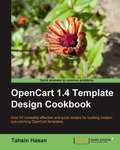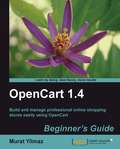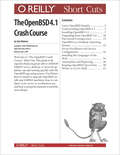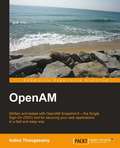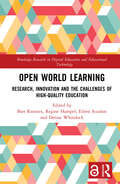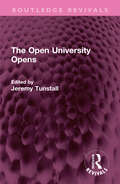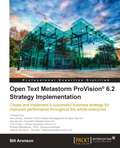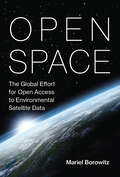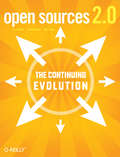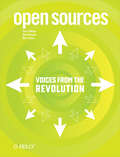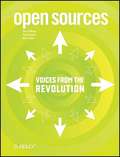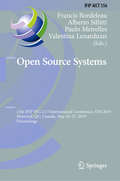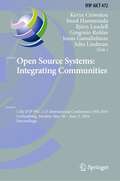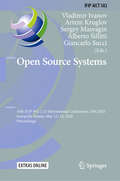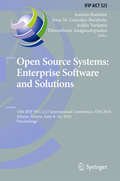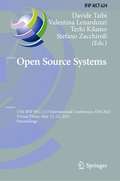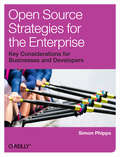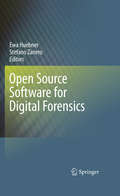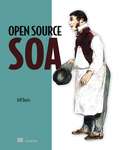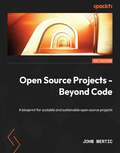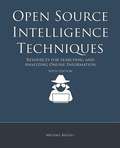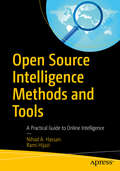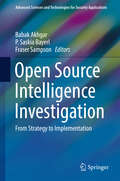- Table View
- List View
OpenCart 1.4 Template Design Cookbook
by Tahsin HasanThis hands-on guide cuts short the preamble and gets straight to the point with practical recipes instead of just theoretical learning. Each recipe is specifically tailored to fulfill your appetite for creating professional visually stunning templates and themes for your OpenCart store.You may be the owner of an OpenCart web store or a designer working with OpenCart. If you want to customize OpenCart to unleash its enormous potential and elevate your store to the next level, this book is for you. You must have some experience with OpenCart and understand its basic features. You also need to know HTML and should be comfortable taking up some challenges in PHP and JavaScript programming.
OpenCart 1.4: Beginner's Guide
by Murat YilmazThis is a tutorial-style book that follows a practical approach to demonstrate the potential of OpenCart. The book is suitable for those who have basic computer skills. Written with a fast-paced but friendly and engaging approach, this Packt Beginner's Guide is designed to be placed alongside the computer as your guide and mentor. Step-by-step tutorials are complemented with explanations of the reasoning behind what you are doing. You will quickly pick up the necessary skills, tips and tricks for building a successful OpenCart online store with practical examples that helps you to learn by experiment and play. This book is aimed at individuals who want to develop professional online stores without any hands-on programming experience, and clients/non-developers who will be managing their inventory and processing orders through the backend.
The OpenBSD 4.0 Crash Course
by Jem MatzanOpenBSD is a Unix-like computer operating system that is widely regarded for its excellent documentation and its fanatical focus on security. "The OpenBSD Crash Course" Short Cut will help you get an x86 or AMD64/EM64T server, desktop, or network appliance up and running quickly with OpenBSD. You'll learn how to install or upgrade OpenBSD on x86 and AMD64 machines, how to configure it for server or workstation use, and how to properly maintain it until the next release.
OpenAM
by Indira ThangasamyThis book is a step-by-step tutorial stuffed with practical, real-world examples. It is designed in such a way that if you are already familiar with OpenAM, you can easily skip to a later chapter without missing a beat. You should be able to quickly grasp the basic elements of OpenAM before moving on to the more advanced features and functionality. If you are a security architect or a solution developer responsible for the design and development of web-based enterprise applications that need to provide authentication, authorization, and audit facilities along with SSO capabilities, then this book is for you. You do not require any prior knowledge of OpenAM to read this book. Familiarity with Java will be helpful, but is not essential.
Open World Learning: Research, Innovation and the Challenges of High-Quality Education (Routledge Research in Digital Education and Educational Technology)
by Bart Rienties Regine Hampel Eileen Scanlon Denise WhitelockThis book provides state-of-the-art contemporary research insights into key applications and processes in open world learning. Open world learning seeks to understand access to education, structures, and the presence of dialogue and support systems. It explores how the application of open world and educational technologies can be used to create opportunities for open and high-quality education. Presenting ground-breaking research from an award winning Leverhulme doctoral training programme, the book provides several integrated and cohesive perspectives of the affordances and limitations of open world learning. The chapters feature a wide range of open world learning topics, ranging from theoretical and methodological discussions to empirical demonstrations of how open world learning can be effectively implemented, evaluated, and used to inform theory and practice. The book brings together a range of innovative uses of technology and practice in open world learning from 387,134 learners and educators learning and working in 136 unique learning contexts across the globe and considers the enablers and disablers of openness in learning, ethical and privacy implications, and how open world learning can be used to foster inclusive approaches to learning across educational sectors, disciplines and countries. The book is unique in exploring the complex, contradictory and multi-disciplinary nature of open world learning at an international level and will be of great interest to academics, researchers, professionals, and policy makers in the field of education technology, e-learning and digital education.
The Open University Opens (Routledge Revivals)
by Jeremy TunstallStill going strong today, The Open University, Britain’s national correspondence – TV – radio University, excited much controversy when it first opened and in 1973 awarded its first degrees. With its adult, part-time students, its freedom from formal entrance qualifications, it deliberately questioned many orthodoxies of higher education at the time. Yet the OU differed so much from other universities that few outsiders grasped quite how complex, quite how revolutionary, quite how downright infuriating the OU was, or could be.Originally published in 1974, this book gives a first-hand account of what the OU was about and what it felt like to be an OU student or lecturer. The articles in the collection – edited by Jeremy Tunstall, himself on the OU staff – include contributions from outside observers, from OU staff, and from OU students. This is an unofficial yet informed and lively account of what it felt like in 1974, and what it felt like in the early days, to be part of a project so controversial and progressive.
Open Text Metastorm ProVision® 6.2 Strategy Implementation
by Bill AronsonThis is both a practical and theoretical guide detailing how to deploy a successful ProVision® strategy, using a number of real business cases along the way. Unlike other architecture books, the approach is holistic - it looks at the whole lifecycle of building a business case, through to using the product. It combines a detailed understanding of the ProVision® toolset with a practical grasp of the business issues that affect the implementation of a successful strategy.If you are a business architect or CIO in a large organization who wants to implement a successful strategy using Open Text ProVision®, then this book is for you. It will also be of interest if you are an enterprise designer or architect. It might be that you already have working knowledge of ProVision®, but do not yet have the skill to implement it in the right context; this book will help you get there.
Open Standards and the Digital Age
by Andrew L. RussellHow did openness become a foundational value for the networks of the twenty-first century? Open Standards and the Digital Age answers this question through an interdisciplinary history of information networks that pays close attention to the politics of standardization. For much of the twentieth century, information networks such as the monopoly Bell System and the American military's Arpanet were closed systems subject to centralized control. In the 1970s and 1980s, however, engineers in the United States and Europe experimented with design strategies to create new digital networks. In the process, they embraced discourses of "openness" to describe their ideological commitments to entrepreneurship, technological innovation, and participatory democracy. The rhetoric of openness has flourished - for example, in movements for open government, open source software, and open access publishing - but such rhetoric also obscures the ways the Internet and other "open" systems still depend heavily on hierarchical forms of control.
Open Space: The Global Effort for Open Access to Environmental Satellite Data (Information Policy)
by Mariel BorowitzAn examination of environmental satellite data sharing policies, offering a model of data-sharing policy development, case and practical recommendations for increasing global data sharing.Key to understanding and addressing climate change is continuous and precise monitoring of environmental conditions. Satellites play an important role in collecting climate data, offering comprehensive global coverage that can't be matched by in situ observation. And yet, as Mariel Borowitz shows in this book, much satellite data is not freely available but restricted; this remains true despite the data-sharing advocacy of international organizations and a global open data movement. Borowitz examines policies governing the sharing of environmental satellite data, offering a model of data-sharing policy development and applying it in case studies from the United States, Europe, and Japan—countries responsible for nearly half of the unclassified government Earth observation satellites. Borowitz develops a model that centers on the government agency as the primary actor while taking into account the roles of such outside actors as other government officials and non-governmental actors, as well as the economic, security, and normative attributes of the data itself. The case studies include the U.S. National Aeronautics and Space Administration (NASA) and the U.S. National Oceanographic and Atmospheric Association (NOAA), and the United States Geological Survey (USGS); the European Space Agency (ESA) and the European Organization for the Exploitation of Meteorological Satellites (EUMETSAT); and the Japanese Aerospace Exploration Agency (JAXA) and the Japanese Meteorological Agency (JMA). Finally, she considers the policy implications of her findings for the future and provides recommendations on how to increase global sharing of satellite data.
Open Sources 2.0
by Chris Dibona Danese Cooper Mark StoneOpen Sources 2.0 is a collection of insightful and thought-provoking essays from today's technology leaders that continues painting the evolutionary picture that developed in the 1999 book Open Sources: Voices from the Revolution . These essays explore open source's impact on the software industry and reveal how open source concepts are infiltrating other areas of commerce and society. The essays appeal to a broad audience: the software developer will find thoughtful reflections on practices and methodology from leading open source developers like Jeremy Allison and Ben Laurie, while the business executive will find analyses of business strategies from the likes of Sleepycat co-founder and CEO Michael Olson and Open Source Business Conference founder Matt Asay. From China, Europe, India, and Brazil we get essays that describe the developing world's efforts to join the technology forefront and use open source to take control of its high tech destiny. For anyone with a strong interest in technology trends, these essays are a must-read. The enduring significance of open source goes well beyond high technology, however. At the heart of the new paradigm is network-enabled distributed collaboration: the growing impact of this model on all forms of online collaboration is fundamentally challenging our modern notion of community. What does the future hold? Veteran open source commentators Tim O'Reilly and Doc Searls offer their perspectives, as do leading open source scholars Steven Weber and Sonali Shah. Andrew Hessel traces the migration of open source ideas from computer technology to biotechnology, and Wikipedia co-founder Larry Sanger and Slashdot co-founder Jeff Bates provide frontline views of functioning, flourishing online collaborative communities. The power of collaboration, enabled by the internet and open source software, is changing the world in ways we can only begin to imagine.Open Sources 2.0 further develops the evolutionary picture that emerged in the original Open Sources and expounds on the transformative open source philosophy. "This is a wonderful collection of thoughts and examples by great minds from the free software movement, and is a must have for anyone who follows free software development and project histories." --Robin Monks, Free Software Magazine The list of contributors include Alolita Sharma Andrew Hessel Ben Laurie Boon-Lock Yeo Bruno Souza Chris DiBona Danese Cooper Doc Searls Eugene Kim Gregorio Robles Ian Murdock Jeff Bates Jeremy Allison Jesus M. Gonzalez-Barahona Kim Polese Larry Sanger Louisa Liu Mark Stone Mark Stone Matthew N. Asay Michael Olson Mitchell Baker Pamela Jones Robert Adkins Russ Nelson Sonali K. Shah Stephen R. Walli Steven Weber Sunil Saxena Tim O'Reilly Wendy Seltzer
Open Sources
by Chris Dibona Sam OckmanFreely available source code, with contributions from thousands of programmers around the world: this is the spirit of the software revolution known as Open Source. Open Source has grabbed the computer industry's attention. Netscape has opened the source code to Mozilla; IBM supports Apache; major database vendors haved ported their products to Linux. As enterprises realize the power of the open-source development model, Open Source is becoming a viable mainstream alternative to commercial software. Now in Open Sources, leaders of Open Source come together for the first time to discuss the new vision of the software industry they have created. The essays in this volume offer insight into how the Open Source movement works, why it succeeds, and where it is going. For programmers who have labored on open-source projects, Open Sources is the new gospel: a powerful vision from the movement's spiritual leaders. For businesses integrating open-source software into their enterprise, Open Sources reveals the mysteries of how open development builds better software, and how businesses can leverage freely available software for a competitive business advantage. The contributors here have been the leaders in the open-source arena: Brian Behlendorf (Apache) Kirk McKusick (Berkeley Unix) Tim O'Reilly (Publisher, O'Reilly & Associates) Bruce Perens (Debian Project, Open Source Initiative) Tom Paquin and Jim Hamerly (mozilla.org, Netscape) Eric Raymond (Open Source Initiative) Richard Stallman (GNU, Free Software Foundation, Emacs) Michael Tiemann (Cygnus Solutions) Linus Torvalds (Linux) Paul Vixie (Bind) Larry Wall (Perl) This book explains why the majority of the Internet's servers use open- source technologies for everything from the operating system to Web serving and email. Key technology products developed with open-source software have overtaken and surpassed the commercial efforts of billion dollar companies like Microsoft and IBM to dominate software markets. Learn the inside story of what led Netscape to decide to release its source code using the open-source mode. Learn how Cygnus Solutions builds the world's best compilers by sharing the source code. Learn why venture capitalists are eagerly watching Red Hat Software, a company that gives its key product -- Linux -- away. For the first time in print, this book presents the story of the open- source phenomenon told by the people who created this movement. Open Sources will bring you into the world of free software and show you the revolution.
Open Sources: Voices from the Open Source Revolution
by Chris Dibona Mark Stone Sam Ockman Open Source Organization Brian Behlendorf Scott Bradner Jim Hamerly Kirk Mckusick Tim O'Reilly Tom Paquin Bruce Perens Eric S. Raymond Richard Stallman Michael Tiemann Linus Torvalds Paul Vixie Larry Wall Bob YoungThrough essays that explain how the movement works, why it succeeds, and where it is going. A powerful vision from the movement's spiritual leaders, this book reveals the mysteries of how open development builds better software and how businesses can leverage freely available software for a competitive business advantage.
Open Source Systems: 15th IFIP WG 2.13 International Conference, OSS 2019, Montreal, QC, Canada, May 26–27, 2019, Proceedings (IFIP Advances in Information and Communication Technology #556)
by Francis Bordeleau Alberto Sillitti Paulo Meirelles Valentina LenarduzziThis open access book constitutes the refereed proceedings of the 15th IFIP WG 2.13 International Conference on Open Source Systems, OSS 2019, held in Montreal, Quebec, Canada, in May 2019.The 10 revised full papers and 5 short papers presented were carefully reviewed and selected from 35 submissions. The papers cover a wide range of topics in the field of free/libre open source software (FLOSS) and are organized in the following thematic sections: mining OSS data; organizational aspects of FLOSS projects; FLOSS adoption; FLOSS cost and licenses; and FLOSS education and training.
Open Source Systems: Integrating Communities
by Kevin Crowston Imed Hammouda Björn Lundell Gregorio Robles Jonas Gamalielsson Juho LindmanThis book constitutes the refereed proceedings of the 12th International IFIP WG 2. 13 International Conference on Open Source Systems, OSS 2016, held in Gothenburg, Sweden, in May/June 2016. The 13 revised full papers presented were carefully reviewed and selected from 38 submissions. The papers cover a wide range of topics related to free, libre, and open source software, including: organizational aspects of communities; organizational adoption; participation of women; software maintenance and evolution; open standards and open data; collaboration; hybrid communities; code reviews; and certification.
Open Source Systems: 12th IFIP WG 2.13 International Conference, OSS 2016, Gothenburg, Sweden, May 30 - June 2, 2016, Proceedings (IFIP Advances in Information and Communication Technology #472)
by Kevin Crowston Imed Hammouda Björn Lundell Gregorio Robles Jonas Gamalielsson Juho LindmanThis book constitutes the refereed proceedings of the 12th International IFIP WG 2.13 International Conference on Open Source Systems, OSS 2016, held in Gothenburg, Sweden, in May/June 2016. The 13 revised full papers presented were carefully reviewed and selected from 38 submissions. The papers cover a wide range of topics related to free, libre, and open source software, including: organizational aspects of communities; organizational adoption; participation of women; software maintenance and evolution; open standards and open data; collaboration; hybrid communities; code reviews; and certification.
Open Source Systems: 16th IFIP WG 2.13 International Conference, OSS 2020, Innopolis, Russia, May 12–14, 2020, Proceedings (IFIP Advances in Information and Communication Technology #582)
by Vladimir Ivanov Artem Kruglov Sergey Masyagin Alberto Sillitti Giancarlo SucciThis book constitutes the refereed proceedings of the 16th IFIP WG 2.13 International Conference on Open Source Systems, OSS 2020, held in Innopolis, Russia, in May 2020.* The 12 revised full papers and 8 short papers presented were carefully reviewed and selected from 42 submissions. The papers cover a wide range of topics in the field of free/libre open source software (FLOSS) and discuss theories, practices, experiences, and tools on development and applications of OSS systems, with a specific focus on two aspects:(a) the development of open source systems and the underlying technical, social, and economic issue, (b) the adoption of OSS solutions and the implications of such adoption both in the public and in the private sector.*Due to the COVID-19 pandemic, the conference was held virtually.
Open Source Systems: 14th IFIP WG 2.13 International Conference, OSS 2018, Athens, Greece, June 8-10, 2018, Proceedings (IFIP Advances in Information and Communication Technology #525)
by Ioannis Stamelos Jesus M. Gonzalez-Barahoña Iraklis Varlamis Dimosthenis AnagnostopoulosThis book constitutes the refereed proceedings of the 14th IFIP WG 2.13 International Conference on Open Source Systems, OSS 2018, held in Athens, Greece, in June 2018.The 14 revised full papers and 2 short papers presented were carefully reviewed and selected from 38 submissions. The papers cover a wide range of topics in the field of free/libre open source software (FLOSS) and are organized in the following thematic sections: organizational aspects of OSS projects, OSS projects validity, mining OSS data, OSS in public administration, OSS governance, and OSS reusability.
Open Source Systems: 17th IFIP WG 2.13 International Conference, OSS 2021, Virtual Event, May 12–13, 2021, Proceedings (IFIP Advances in Information and Communication Technology #624)
by Davide Taibi Valentina Lenarduzzi Terhi Kilamo Stefano ZacchiroliThis book constitutes the refereed proceedings of the 17th IFIP WG 2.13 International Conference on Open Source Systems, OSS 2021, held virtually in May 2021.The 4 full papers and 3 short papers presented were carefully reviewed and selected from 23 submissions. The papers cover a wide range of topics in the field of free/libre open source software (FLOSS) and discuss theories, practices, experiences, and tools on development and applications of OSS systems, with a specific focus on two aspects:(a) the development of open source systems and the underlying technical, social, and economic issue, (b) the adoption of OSS solutions and the implications of such adoption both in the public and in the private sector.
Open Source Strategies for the Enterprise
by Simon PhippsSo you're thinking of creating an open source community around your code? Here are some things you ought to know before you make your plans too firm. Community Types: There is no single "open source community." Rather, there are many groups of people gathered around many free software commons. Those gatherings are themselves of several different types; you really need to understand those differences. Payment at the Point of Value: Open source is of course free software. But the freedom you're finding brings you value varies depending on the role you play with respect to the software. "Free" doesn't mean the same to everyone. Open Core Is Bad For You: The "open core" business model is popular with VC-funded startup companies but does not deliver the core freedoms from which lasting business value for customers is derived. Transparency and Privacy: The key success factor in an open source community is the equality of all the participants. A strong community is characterized by high levels of transparency about the project coupled with strong respect for the privacy of the participants. Read why you should not impose your business model on anyone.
Open Source Software for Digital Forensics
by Stefano Zanero Ewa HuebnerOpen Source Software for Digital Forensics is the first book dedicated to the use of FLOSS (Free Libre Open Source Software) in computer forensics. It presents the motivations for using FLOSS applications as tools for collection, preservation and analysis of digital evidence in computer and network forensics. It also covers extensively several forensic FLOSS tools, their origins and evolution. Open Source Software for Digital Forensics is based on the OSSCoNF workshop, which was held in Milan, Italy, September 2008 at the World Computing Congress, co-located with OSS 2008. This edited volume is a collection of contributions from researchers and practitioners world wide. Open Source Software for Digital Forensics is designed for advanced level students and researchers in computer science as a secondary text and reference book. Computer programmers, software developers, and digital forensics professionals will also find this book to be a valuable asset.
Open Source SOA
by Jeff DavisYou can build a world-class SOA infrastructure entirely using popular, andmature, open-source applications. Unfortunately, the technical documentationfor most open-source projects focuses on a specific product, the big SOA picture.You're left to your own devices to figure out how to cobble together a fullsolution from the various bits. In other words, unless you already know howMule and Tuscany work with jBPM, you're stuck.Open Source SOA shows readers how to build an entire SOA application usingopen-source technologies. It shows readers how to apply key ideas like EnterpriseService Bus (ESB) design and Business Process Management (BPM) and learnthe tools and techniques to implement them effectively.To pull everything together, the author describes real-life case studies from hisown work to tie together all the principles and practices. These hard-to-find casestudies are pure gold for the reader, as most developers keep these trade secretsto themselves. Purchase of the print book comes with an offer of a free PDF, ePub, and Kindle eBook from Manning. Also available is all code from the book.
Open Source Projects - Beyond Code: A blueprint for scalable and sustainable open source projects
by John MerticAccelerate your career and make an impact by launching and running a successful open source project. Purchase of the print or Kindle book includes a free PDF eBookKey FeaturesUnderstand the method and rationale for launching an open source projectExplore best practices and insights for running an open source projectLeverage open source projects to advance your careerBook DescriptionOpen source is ubiquitous in our society, with countless existing projects, and new ones emerging every day. It follows a "scratch-your-own-itch" model where contributors and maintainers drive the project forward. Through Open Source Projects - Beyond Code, you'll learn what it takes to develop a successful, scalable, and sustainable open source project. In this book, you'll explore the full life cycle of open source projects, from inception, through launch, to maturity, and then discover how to sunset an open source project responsibly. Along the way, you'll learn the concepts of licensing, governance, community building, ecosystem management, and growing maintainers and contributors, as well as understand how other open source projects have been successful or might have struggled in some areas. You can use this book as an end-to-end guide or reference material for the future. By the end of this book, you'll be able to accelerate your career in open source. Your newly acquired skills will help you stay ahead of the curve even with the ever-evolving nature of technology.What you will learnExplore what is open source and how you can use it to accelerate your careerStart an open source project while exploring its key considerationsGrow, support, and manage a vast community of developers and usersBuild and maintain a mature and sustainable projectEnable mass users and developers to downstream productization and outreachUse open source as a portfolio to build your careerUnderstand when to end a project and conduct it responsiblyWho this book is forThis book is for software developers, product managers, project managers, business leaders, or general enthusiasts looking to start an open source project or currently maintaining one.
Open Source Intelligence Techniques: Resources For Searching And Analyzing Online Information
by Michael BazzellAuthor Michael Bazzell has been well known in government circles for his ability to locate personal information about any target through Open Source Intelligence (OSINT). In this book, he shares his methods in great detail. Each step of his process is explained throughout twenty-five chapters of specialized websites, software solutions, and creative search techniques. Over 250 resources are identified with narrative tutorials and screen captures. This book will serve as a reference guide for anyone that is responsible for the collection of online content. It is written in a hands-on style that encourages the reader to execute the tutorials as they go. The search techniques offered will inspire analysts to "think outside the box" when scouring the internet for personal information. Much of the content of this book has never been discussed in any publication. Always thinking like a hacker, the author has identified new ways to use various technologies for an unintended purpose. This book will greatly improve anyone's online investigative skills.
Open Source Intelligence Methods and Tools: A Practical Guide to Online Intelligence
by Nihad A. Hassan Rami HijaziApply Open Source Intelligence (OSINT) techniques, methods, and tools to acquire information from publicly available online sources to support your intelligence analysis. Use the harvested data in different scenarios such as financial, crime, and terrorism investigations as well as performing business competition analysis and acquiring intelligence about individuals and other entities. This book will also improve your skills to acquire information online from both the regular Internet as well as the hidden web through its two sub-layers: the deep web and the dark web.The author includes many OSINT resources that can be used by intelligence agencies as well as by enterprises to monitor trends on a global level, identify risks, and gather competitor intelligence so more effective decisions can be made. You will discover techniques, methods, and tools that are equally used by hackers and penetration testers to gather intelligence about a specific target online. And you will be aware of how OSINT resources can be used in conducting social engineering attacks. Open Source Intelligence Methods and Tools takes a practical approach and lists hundreds of OSINT resources that can be used to gather intelligence from online public sources. The book also covers how to anonymize your digital identity online so you can conduct your searching activities without revealing your identity. What You’ll Learn Identify intelligence needs and leverage a broad range of tools and sources to improve data collection, analysis, and decision making in your organizationUse OSINT resources to protect individuals and enterprises by discovering data that is online, exposed, and sensitive and hide the data before it is revealed by outside attackersGather corporate intelligence about business competitors and predict future market directionsConduct advanced searches to gather intelligence from social media sites such as Facebook and TwitterUnderstand the different layers that make up the Internet and how to search within the invisible web which contains both the deep and the dark webs Who This Book Is For Penetration testers, digital forensics investigators, intelligence services, military, law enforcement, UN agencies, and for-profit/non-profit enterprises
Open Source Intelligence Investigation
by Babak Akhgar P. Saskia Bayerl Fraser SampsonOne of the most important aspects for a successful police operation is the ability for the police to obtain timely, reliable and actionable intelligence related to the investigation or incident at hand. Open Source Intelligence (OSINT) provides an invaluable avenue to access and collect such information in addition to traditional investigative techniques and information sources. This book offers an authoritative and accessible guide on how to conduct Open Source Intelligence investigations from data collection to analysis to the design and vetting of OSINT tools. In its pages the reader will find a comprehensive view into the newest methods for OSINT analytics and visualizations in combination with real-life case studies to showcase the application as well as the challenges of OSINT investigations across domains. Examples of OSINT range from information posted on social media as one of the most openly available means of accessing and gathering Open Source Intelligence to location data, OSINT obtained from the darkweb to combinations of OSINT with real-time analytical capabilities and closed sources. In addition it provides guidance on legal and ethical considerations making it relevant reading for practitioners as well as academics and students with a view to obtain thorough, first-hand knowledge from serving experts in the field.
